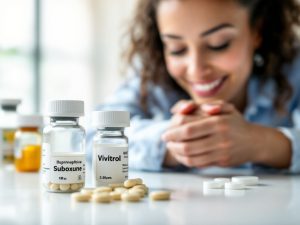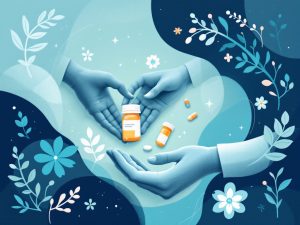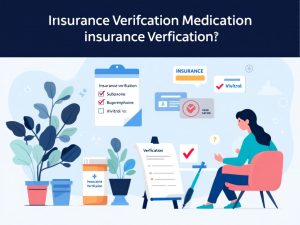Explore the power of addiction recovery education
When you begin learning about addiction recovery education, you take a pivotal step toward regaining control of your life. This specialized education equips you with the knowledge, strategies, and confidence needed to address substance use issues head-on. It also provides the foundation for informed decision-making about the different steps in your recovery journey. By understanding the physical, emotional, and social dimensions of addiction—along with learning about the resources available—you set the stage for meaningful, long-lasting change.
At Epic Health Partners, you or your loved one can experience outpatient behavioral health, psychiatric, and substance-use care that centers on personal growth and holistic well-being. As you deepen your understanding of addiction and the science behind it, you also discover effective ways to cope with triggers, manage stress, and cultivate healthier relationships. Because substance use disorders often affect many areas of life, an educational approach that integrates evidence-based therapies, support networks, and relapse-prevention strategies becomes crucial for lasting recovery.
Emphasis on hope and empowerment
The journey toward recovery does not need to be a solitary struggle. When you engage in specialized education about addiction, you gain both the self-awareness and the reassurance that recovery is possible. Empowerment begins when you recognize that your struggles with substance use do not define you. You are capable of change and worthy of compassionate care. Through continued learning—particularly about how addiction functions, why relapses happen, and which treatments are most effective—you can transform feelings of isolation into hope for a more fulfilling future.
Addressing unique personal factors
Every individual brings a unique set of circumstances to treatment, such as medical history, personal life challenges, work obligations, and cultural or family pressures. This is where addiction recovery education truly shines. By understanding that addiction is a chronic condition, much like heart disease or asthma (National Institute on Drug Abuse), you can begin to see the need for continuous, customized care. Rather than blaming yourself or others, you learn about the biological, psychological, and social factors fueling addiction. This knowledge paves the way for a nonjudgmental, supportive environment where you feel free to seek help, knowing you are not alone and that your experiences are valid.
Benefit from specialized outpatient care
Choosing Epic Health Partners means having access to specialized outpatient programs that fit diverse lifestyles and needs. Outpatient care can be particularly appealing if you or a loved one must maintain family obligations, work responsibilities, or educational pursuits while pursuing treatment. The flexible structure of outpatient programs allows you to attend therapy sessions and educational workshops without uprooting your entire daily routine.
Intensive outpatient and partial hospitalization programs
For a more structured approach, you might consider an intensive outpatient program iop where you spend multiple days each week in therapy sessions, group discussions, and educational modules. This program helps you deepen your knowledge of addiction, develop critical coping skills, and gain peer support. Similarly, a partial hospitalization program php offers an even higher level of care during the day, with the comfort of returning home in the evenings. Both formats ensure that you learn evidence-based methods for dealing with triggers, managing stress, and preventing relapse.
Telehealth for modern convenience
Travel or mobility obstacles no longer need to stand in the way of quality care. With telehealth therapy services, you can stick to a consistent schedule of therapy, counseling, and education from the comfort and privacy of your home. Whether you are located in a remote area, balance a hectic work schedule, or simply prefer virtual consultations, telehealth sessions help eliminate barriers to treatment. This flexibility ensures that you remain engaged in the recovery process, maintaining momentum and motivation.
The supportive role of medication
For some individuals, medication can be a vital component of outpatient addiction treatment. Through medication assisted treatment mat and ongoing medication management, you can address withdrawal symptoms and cravings in tandem with talk therapy and other interventions. Medications are used in treating opioid, alcohol, or nicotine dependence (National Institute on Drug Abuse), and they are always paired with behavioral support. This comprehensive approach offers better outcomes by reducing the risk of relapse, stabilizing health, and allowing you to focus on rebuilding your life.
Embrace a holistic treatment approach
When it comes to addressing the complexities of addiction, a holistic treatment model often proves most effective. By viewing addiction as more than just a physical dependency, Epic Health Partners encourages you to acknowledge, understand, and work through mental, emotional, and social elements tied to substance use. This approach nurtures every aspect of your well-being, ensuring that you receive the support necessary for lasting recovery.
Integrating mind and body
A holistic environment includes therapies that cultivate the mind-body connection, fostering emotional resilience and stress relief. You may explore yoga art therapy music therapy techniques that inspire creative expression and calm the nervous system. Holistic wellness practices also address co-occurring mental health concerns such as anxiety, depression, or trauma, creating more opportunities to tailor treatment to your individual needs.
Personalized care for co-occurring conditions
Many people enter treatment with more than one challenge, such as anxiety disorders, bipolar disorder, or unresolved trauma. In fact, research shows that co-occurring conditions are common, and they influence your path to recovery. By pursuing dual diagnosis treatment or co occurring disorders treatment, you can concentrate on both substance use and any underlying mental health disorders. This integrative focus provides comprehensive care, ensuring that neither your substance use nor any mental health challenge is ignored.
Family and community support
Addiction often ripples out, affecting the dynamics of families and entire communities. Engaging in family-focused services—like family counseling mental health—allows loved ones to better understand the nature of addiction, learn healthy communication strategies, and cultivate a healing environment at home. Community-oriented resources, such as comprehensive crisis services and community stabilization services, can also create a safety net when you are coping with life stresses and transitions.
Identify the role of evidence-based therapies
At the heart of Epic Health Partners’ approach are treatments that are backed by scientific research. Evidence-based therapies have been studied extensively for their efficacy, helping you feel confident that your time and effort are well spent. These therapies include certain forms of counseling, behavioral interventions, and other structured methods shown to improve outcomes in addiction recovery.
Cognitive-behavioral interventions
Cognitive behavioral therapy cbt is a common evidence-based method proven to help people identify and reframe negative thought patterns contributing to substance use. This structured approach includes practical strategies aimed at coping with daily challenges, building resilience, practicing stress management, and learning assertiveness (NAATP). As you continue CBT sessions, you gain insight into harmful beliefs that underlie addiction and discover how to replace them with healthier, more affirming habits.
Dialectical behavior therapy and motivational interviewing
Dialectical behavior therapy dbt is another evidence-based treatment often employed when trauma or emotional dysregulation complicate recovery. This approach highlights emotional regulation, distress tolerance, and interpersonal effectiveness. Meanwhile, motivational interviewing therapy encourages you to explore and resolve any ambivalence about change, supporting you in seeking the motivation needed to move forward in your recovery journey.
Group counseling and experiential therapies
Individual therapy remains essential, but group-based treatments are also valuable. Group therapy mental health brings peers together to share experiences, reduce social isolation, and gain mutual understanding. This community aspect can boost accountability and self-esteem, making it easier to talk about personal struggles. Additionally, experiential therapies, including role-playing or guided imagery, help you process emotions in real time (NAATP). Such hands-on methods pull subconscious concerns into the open, enabling you to confront and release them in a structured environment.
Addressing trauma
Trauma-informed counseling or trauma informed counseling acknowledges that previous traumatic experiences often drive or exacerbate substance use. EMDR (Eye Movement Desensitization and Reprocessing) has been recognized as effective for addressing trauma and trauma-related emotional distress (NAATP). By focusing directly on traumatic memories and feelings, you can reduce their intensity and learn healthier coping mechanisms. When trauma is addressed properly, the need to self-medicate with substances often decreases, paving the way toward improved emotional stability and sustained sobriety.
Collaborate with caring professionals
Throughout your experience at Epic Health Partners, you can count on the presence of skilled professionals who display empathy, compassion, and expertise. From licensed therapists to board-certified psychiatrists, each member of the team is dedicated to providing you with a sense of safety and understanding. This culture of care encourages open communication about your challenges, needs, and hopes for the future.
Psychiatric evaluations and medication oversight
When dealing with mental health challenges alongside substance use, specialized professional oversight becomes critical. Psychiatric evaluation outpatient services ensure that you have a clear diagnosis and a viable treatment plan. If medication is appropriate, ongoing medication management helps you stay on track and manage any side effects or adjustments. These steps help create stability in your mental health, thereby minimizing future relapse risks.
Individualized case management
Overcoming addiction can be logistically overwhelming. You may need to coordinate multiple services, schedule sessions, or look into housing and childcare solutions. Case management sud services lighten this burden by helping you navigate these tasks, find local resources, and stay organized within your comprehensive recovery plan. This support can significantly ease the stress of juggling responsibilities, allowing you to focus more on learning, healing, and personal growth.
Peer support and mentorship
Sometimes the most impactful guidance comes from individuals who have been in your shoes. At Epic Health Partners, you can connect with peer support groups where mentors and peers provide encouragement from firsthand experience. Being able to share stories, setbacks, and achievements in a supportive environment fosters camaraderie and helps you feel less isolated. This sense of community, grounded in shared experience, often enhances your commitment to the recovery process.
Prepare for ongoing success
Recovery extends far beyond simply quitting the use of drugs or alcohol. True transformation involves sustaining and nurturing a healthy lifestyle, building rewarding relationships, and establishing new goals for the future. From relapse prevention to extended aftercare, Epic Health Partners offers resources that safeguard your progress and help you grow as you navigate this next chapter of life.
Relapse prevention planning and aftercare
Relapse is sometimes part of the journey, not a sign of failure (National Institute on Drug Abuse). By developing a solid relapse prevention planning framework, you learn to recognize red flags, manage cravings, and reduce high-risk situations. After primary treatment, aftercare planning ensures that you remain connected to ongoing support through follow-up sessions, involvement in community groups, or online resources. These services emphasize that long-term stability comes from continual engagement in your own healing process.
Building a strong social network
A supportive network can dramatically improve your resilience and protect you from potential relapse triggers. Programs like group therapy mental health and family counseling mental health nurture empathy, understanding, and accountability. Beyond formal group settings, you might opt for local community groups, volunteer opportunities, or social clubs to expand your web of support. Feeling seen, appreciated, and understood by others can help you maintain motivation and stay on track during challenging times.
Holistic wellness for life
As you develop new coping mechanisms, remember that well-rounded self-care remains paramount. Blending mind, body, and spirit fosters a stronger foundation to combat stress and avoid future substance use. In addition to formal therapies, you might find value in wellness activities, from meditation and journaling to exploring holistic wellness support programs. These techniques can be seamlessly integrated into daily life, whether you are addressing work stress, family responsibilities, or emotional upheavals.
Additional specialized services
Sometimes, your healing journey may require exploring more targeted solutions, especially if you are dealing with specific mental health challenges. You can access anxiety treatment services, depression treatment services, bipolar disorder treatment, or adhd treatment services based on your personal circumstances. If you are a parent concerned about your child’s well-being, child psychiatry services and intensive in home services ensure that younger individuals receive the same evidence-based care and attention.
Services like child comprehensive crisis services can be critical in emergencies, helping families stabilize rapidly. Additionally, bridging educational and treatment realms is made possible through programs like children services act coordination, ensuring seamless collaboration between families, community resources, and medical professionals so that children get the support they need.
Frequently asked questions
1. What is addiction recovery education?
Addiction recovery education refers to the ongoing process of learning about substance use disorders, treatment strategies, and techniques for preventing relapse. It focuses on teaching you about the science of addiction, coping mechanisms for emotional stress, and effective communication skills. This form of education also helps you identify triggers, navigate cravings, and build emotional resilience. By expanding your understanding of addiction, you gain the confidence and clarity needed to pursue a sustained, healthier life.
2. How can outpatient programs at Epic Health Partners benefit me?
Outpatient programs cater to individuals who need flexibility in their treatment schedule. Services like the intensive outpatient program iop or the partial hospitalization program php allow you to receive substantial support, attend therapy sessions, and engage in critical educational modules without staying overnight in a facility. You can continue fulfilling your work, academic, or family obligations while also investing time in structured treatment. This approach supports real-life application of new skills and lessons, which often leads to a more seamless, enduring recovery.
3. What types of therapy are available through Epic Health Partners?
Epic Health Partners adopts an evidence-based approach that offers diverse therapy modalities to match your personal needs. These include cognitive behavioral therapy cbt, dialectical behavior therapy dbt, group therapy mental health, motivational interviewing therapy, and trauma informed counseling. Holistic options like yoga art therapy music therapy also complement these traditional frameworks, giving you a well-rounded set of resources for healing.
4. Do you offer telehealth services for addiction treatment?
Yes. If you need virtual consultations due to location constraints, a busy schedule, or personal preference, telehealth therapy services are available. Through telehealth, you receive professional guidance, therapy sessions, and educational programming, all accessible via secure videoconferencing. This convenience removes travel barriers and helps ensure continuity of care, an essential element for maintaining momentum in recovery.
5. What if I relapse during treatment?
A relapse is not a failure or a reason to abandon your recovery journey. Substance use disorders are chronic conditions with relapse rates comparable to other chronic illnesses, such as hypertension or diabetes (National Institute on Drug Abuse). If you relapse, it typically indicates that your treatment plan needs adjustment or additional support. At Epic Health Partners, you receive compassionate guidance, updated relapse prevention planning, and access to services designed to address the factors that triggered the relapse. Making changes like altering therapies, adjusting medications, or increasing the frequency of counseling can keep you on track toward eventual sustained recovery.
Committing to addiction recovery education is an empowering choice that shapes how you respond to challenges during treatment and beyond. By partnering with Epic Health Partners, you step into a community dedicated to providing you thorough, evidence-informed care. From the flexibility of outpatient scheduling to the range of therapies available, each component of this holistic model is designed to help you heal fully and proactively.
You or your loved one deserve a supportive environment that recognizes the complexity of addiction and mental health issues. With a focus on personalized treatment, family support, and relapse-prevention strategies, Epic Health Partners helps you create a new life in which hope, health, and fulfillment take center stage. If you are ready to benefit from transformative care, reach out to learn how the compassionate experts at Epic Health Partners can guide you toward the future you deserve.







